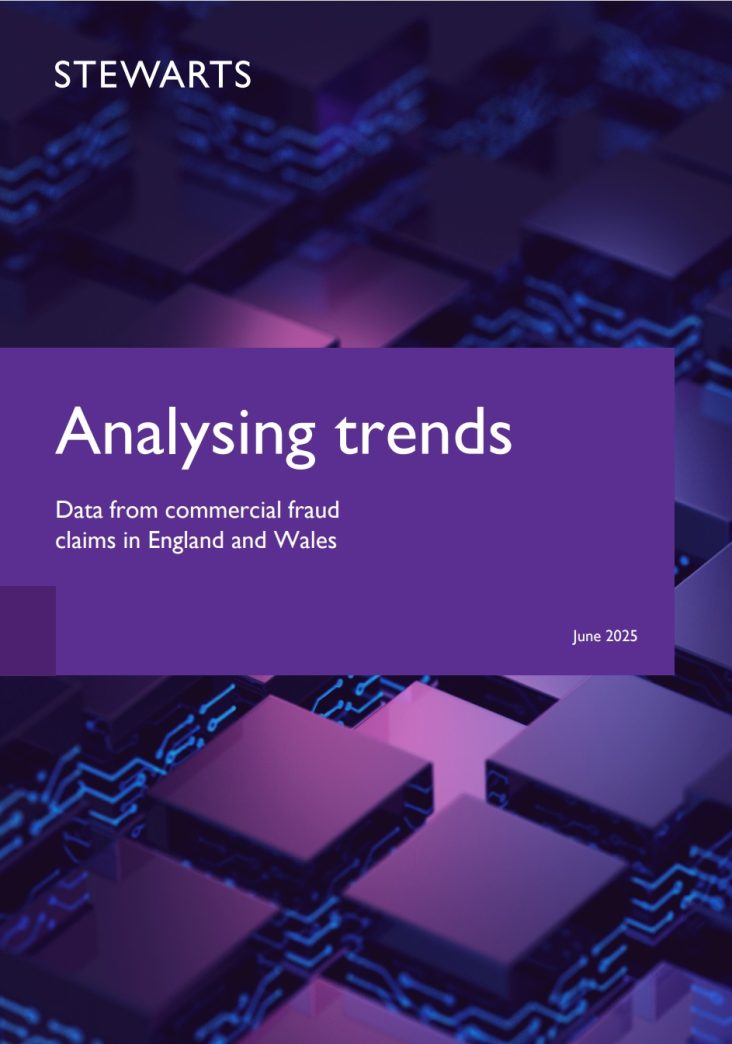Stewarts and Solomonic have again worked together to produce and analyse data in a report on commercial fraud claims in the civil courts of England and Wales.
As part of the 2025 report, Charlie Mercer, Astrid Gilliam, Punam Shah, Ed Holmes, Andrew Robson and Ronak Mahdavi Jovainy analyse recent developments and some upcoming trends in this active area.
Hague Convention of 2 July 2019 on the Recognition of Foreign Judgments in Civil or Commercial Matters
In our last report, we noted that the UK Ministry of Justice was considering responses to a consultation on whether the UK should sign up to and ratify the Hague Convention of 2 July 2019 on the Recognition of Foreign Judgments in Civil or Commercial Matters (“Hague 2019”).
Since then, the UK has announced its intention to accede to Hague 2019, and it will come into force on 1 July 2025.
Hague 2019 establishes common rules to facilitate the recognition and enforcement of foreign judgments between contracting states. Since the end of the Brexit transition period on 31 December 2020, there has not been a comprehensive framework in place between the UK and the EU covering either the recognition and enforcement of civil and commercial judgments or the determination of the proper court to hear a dispute.
The main convention that currently applies is the Hague Convention on Choice of Court Agreements (“Hague 2005”). Hague 2005 has limited application in that it only provides a framework of rules relating to the recognition and enforcement of judgments based on exclusive jurisdiction agreements. Where Hague 2005 is not available, parties have had to rely on any reciprocal enforcement regimes between the UK and the individual member state in which enforcement is sought, or the national rules of that member state, which involves increased time, cost and uncertainty.
Hague 2019 will provide a set of common rules for the recognition and enforcement of judgments between the UK and the EU (which has already acceded to it) and other jurisdictions that choose to adopt it.
As a word of caution, Hague 2019 is not the perfect solution. First, certain types of disputes are excluded, including insolvency disputes and interim measures. Secondly, it does not address jurisdiction, meaning that the threat of parallel proceedings would remain (although work has started on a separate convention to address this issue). Thirdly, it will only apply to claims that are commenced after the date it comes into effect in both the UK and the state of the enforcement proceedings. Finally, Hague 2019 is widely considered to be not as effective as the Lugano Convention, which the UK has applied to rejoin but the EU has not consented to. If the EU consents in the future, the Lugano Convention would effectively supersede Hague 2019 for enforcement in the EU and apply to a broader range of judgments. However, despite these limitations, the framework improves the EU enforcement position post-Brexit.
Failure to Prevent Fraud Offence
As set out in our recent article, a new UK offence of failing to prevent a fraud has been introduced by the Economic Crime and Corporate Transparency Act 2023. The offence is due to come into force in September 2025.
Organisations may be held criminally liable where (1) an employee, agent, subsidiary or other “associated person” commits a fraud; (2) the intention of that fraud is to benefit the organisation (or a client of the organisation); and (3) that organisation did not have reasonable fraud prevention procedures in place.
The offence will apply to “large organisations” that satisfy at least two of the following conditions in the financial year of the organisation preceding the year of the offence: (i) more than 250 employees; (ii) a turnover of over £36m; and/or (iii) assets in excess of £18m.
There are two defences available to organisations. First, where reasonable procedures were in place to prevent the fraud. Secondly, where it was not reasonable in all the circumstances to expect the organisation to have procedures in place that would have prevented the fraud.
Guidance published in November 2024 sets out six flexible and outcome-focused principles for organisations in developing new or enhancing existing procedures to prevent fraud, those being taken from guidance already in place for similar “failure to prevent” offences under the UK Bribery Act 2010: (1) top-level commitment; (2) conducting regular risk assessments; (3) establishing proportionate risk-based prevention procedures; (4) undertaking appropriate due diligence; (5) communicating and embedding policies and procedures within the organisation; and (6) having effective monitoring processes to detect and investigate fraud and to assess the effectiveness of fraud prevention measures.
Therefore, the next few months are crucial for large organisations. From a litigation perspective, it is hard to say whether more fraud will be uncovered as a result of the new measures or whether it will be prevented. As was the case with the Bribery Act 2010, larger organisations will have no option but to take action, which could in turn flush out historic wrongdoing.
Fraud in the disputes process itself
There have been several high-profile cases in the last two years where the disputes process itself has been affected by fraud. These are striking because they are unusual and provide cautionary tales for practitioners.
In Federal Republic of Nigeria v Process and Industrial Developments Limited [2023] EWHC 2638 (Comm) (“Nigeria v P&ID”), arbitration proceedings were commenced in 2012 following a dispute over Nigeria’s alleged breach of a gas supply and construction agreement with P&ID. In July 2015, the London-seated arbitral tribunal accepted P&ID’s allegations. In January 2017, the same tribunal awarded P&ID damages of US$6.6bn, with interest to accrue at 7%. In 2019, Nigeria challenged the arbitral award in the English High Court under section 68 of the Arbitration Act 1996 (serious irregularity) on the basis of alleged bribery and corruption. By that time, the amount owing to P&ID was calculated to be in the order of US$11bn, a highly significant sum for Nigeria.
The award was set aside. The English High Court found that P&ID’s legal team in the arbitration (who remarkably stood to receive up to $3.85bn if P&ID won) had improperly obtained and retained privileged documents. It also found that P&ID had relied on evidence that it knew to be false and had bribed a Nigerian official to buy her silence in the arbitration proceedings in relation to bribes she had accepted when the underlying agreement was entered into.
In Contax Partners Inc BVI v Kuwait Finance House and Ors [2024] EWHC 436 (Comm) (“Contax”), individuals purporting to act on behalf of Contax sought to enforce a totally fictitious arbitration award against Kuwait Finance House (“KFH”). KFH only narrowly avoided a third-party debt order being executed by rapidly securing an urgent injunction and being extremely thorough in its approach to debunking the fabricated award.
Most recently, Nigeria is currently seeking to set aside a further $15m default judgment granted in favour of a businessman that was allegedly procured by fraud (Federal Government of Nigeria and another v. Williams).
Nigeria v P&ID has been used as a platform to criticise arbitration, due to a perceived culture of non-intervention by tribunals and the lack of public scrutiny of awards, in particular where those disputes involve sovereigns. Contax, however, was just a brazen, old-fashioned fraud.

AI in fraud
The potential for AI and deepfake technology to commit fraud is obvious. Indeed, there are already examples of high value deepfake scams that have taken place.
As set out in our recent article, a well-known example of this is the fraud perpetrated against the British professional services multinational Arup. The scam began in January 2024 when a member of staff at Arup in Hong Kong received a message about a “confidential transaction” from a person claiming to be Arup’s UK-based chief financial officer (“CFO”). The staff member who received the email then joined a videoconference with multiple individuals, including one using deepfake technology to resemble the company’s CFO. The targeted staff member was convinced to make 15 transfers from company funds to five different Hong Kong-based bank accounts before eventually contacting Arup’s headquarters and, at that point, discovering the scam.
This scam had a significant impact on Arup, with the equivalent of £20m lost to fraudsters. Further, Arup’s East Asia chair, Andy Lee, quickly departed the business. It provides a cautionary tale for all organisations.
Law Commission consultation on contempt of court
Contempt of court refers to a wide variety of conduct that may impede or interfere with a court case or the administration of justice. It is particularly significant in fraud cases as contempt and, ultimately, committal to prison are the sanctions available for non-compliance with, for example, the terms of a worldwide freezing order.
The law on contempt has developed unsystematically, which has resulted in a regime that is disordered and unclear. In particular, there is a distinction between civil and criminal contempt of court that is confusing and lacking in clarity.
The UK Law Commission has recently been running a consultation on the law in this area. The commission’s provisional proposals included seeking to clarify and codify the law, enhance transparency and accountability and increase consistency and fairness for defendants and other elements. The commission’s final report is awaited.
Stay ahead of the evolving landscape of fraud litigation with our latest report.











